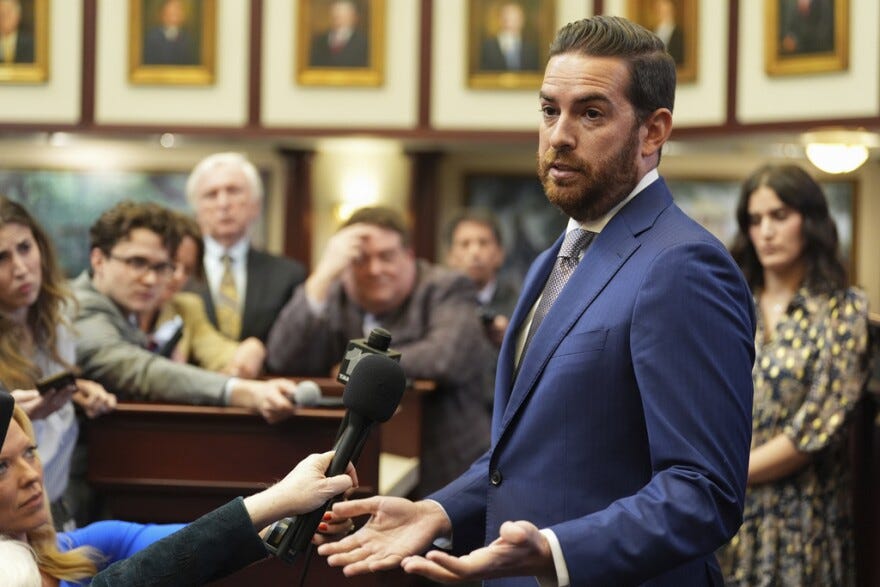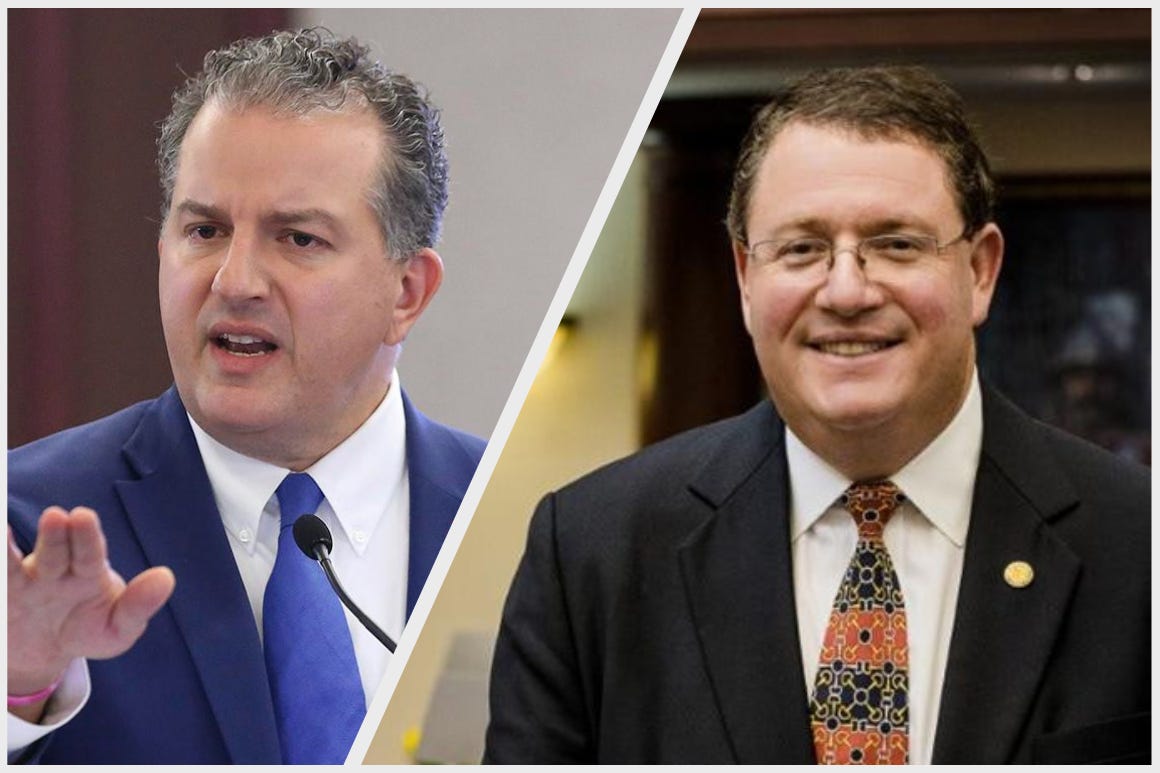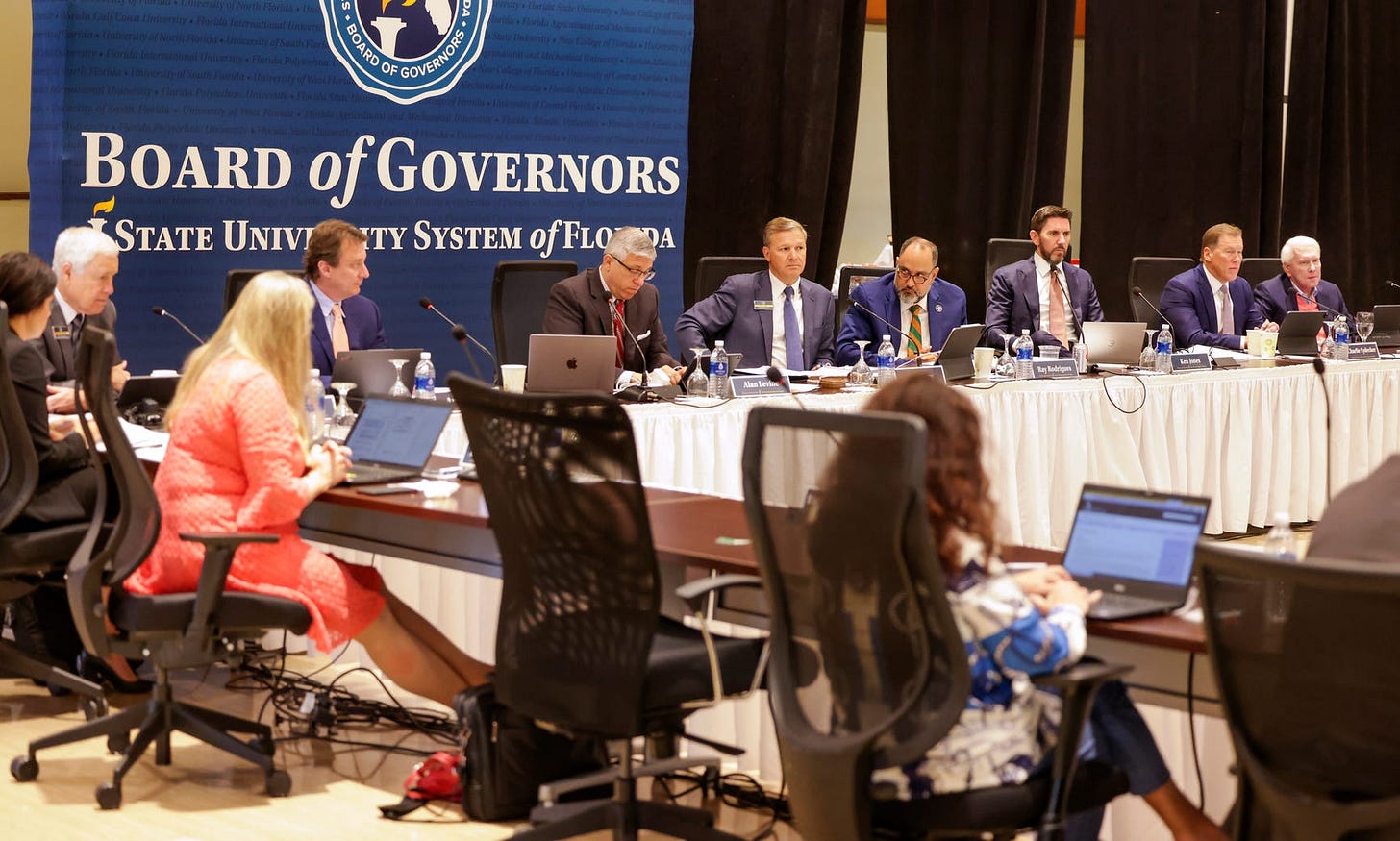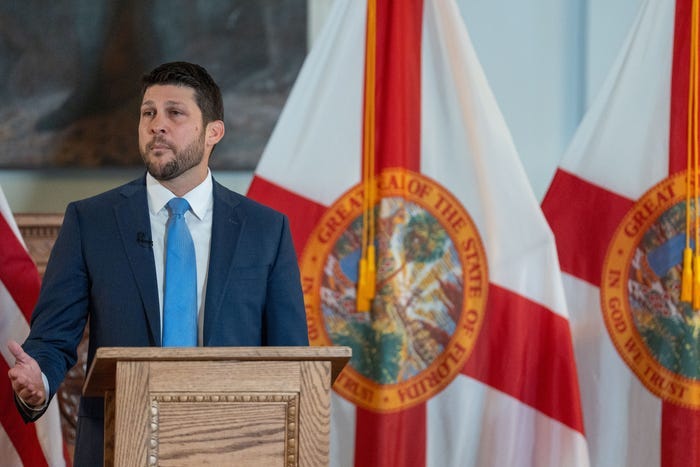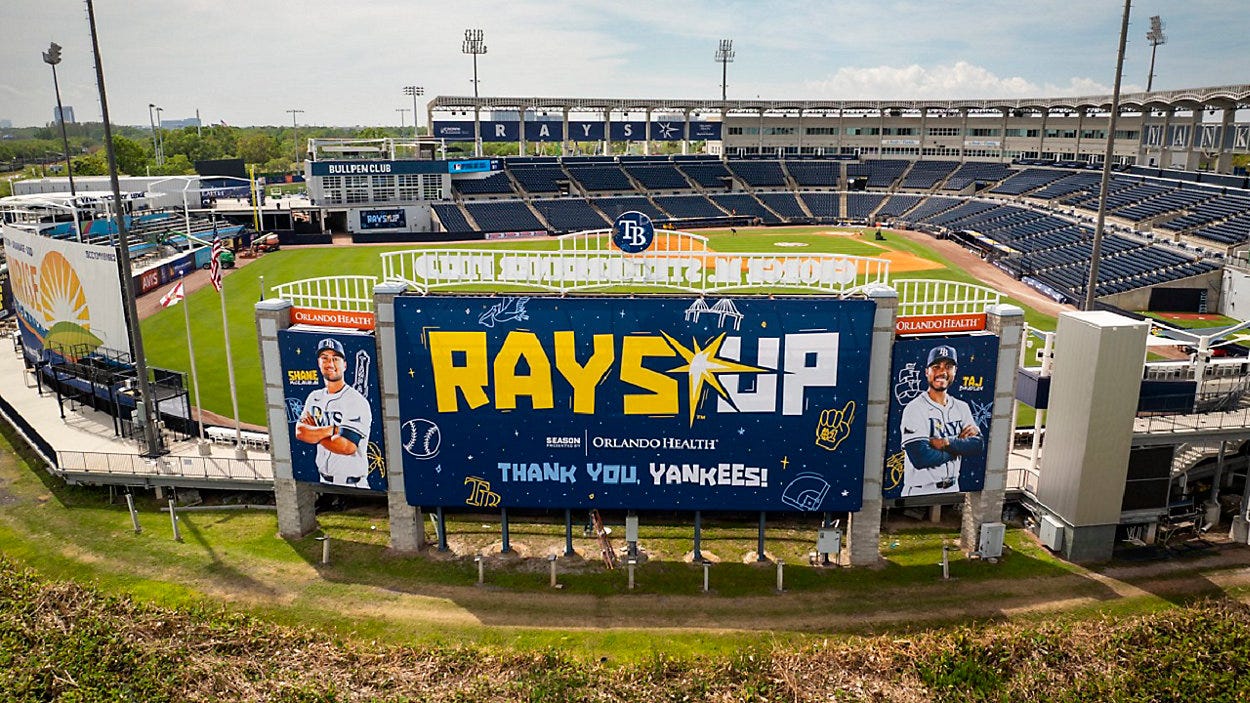A Historic Sales Tax Cut Proposal & Florida's Healthcare Expenses for Undocumented Immigrants Reach $659M
March 31, 2025 - This Week's News from Central Florida
Welcome to this week’s edition of the Central Florida Times, an independent, reader-supported newsletter focusing on the Sunshine State. These are the most important stories you need to know from across Central Florida. To never miss an update, subscribe here:
Here’s the latest from Central Florida…
Florida Proposes Historic Sales Tax Cut
House Speaker Daniel Perez (R-Miami) has proposed a historic sales tax cut, aiming to lower the state rate from 6% to 5.25%. Announced last week, the bold plan would save Floridians approximately $5 billion annually, marking the largest tax reduction in state history. Perez emphasized that this would be a permanent measure, not a temporary tax holiday or gimmick. The proposal, which must pass both legislative chambers before the May 2 session deadline, aims to ease financial pressure on residents as Florida faces affordability concerns. Critics, however, question the budget implications of how the state will offset the revenue loss. Speaker Perez assured that his budget plan includes record funding for K-12 education and suggested trimming unnecessary government spending. This includes eliminating state agency job vacancies that have remained unfilled for over 90 days. House committees have presented a cut to healthcare spending of 2.1%, or around $1 billion, compared to the previous year. Meanwhile, Governor Ron DeSantis has focused on property tax relief to ease the financial burden on Floridians, a proposal requiring a constitutional amendment. While he hasn’t endorsed the sales tax cut, he emphasized that property taxes remain Floridians’ biggest financial burden. Perez, however, noted that property taxes fund important local services like public safety and education, suggesting a reduction in the statewide sales tax rate as an alternative to the governor’s idea. “State government has a spending problem,” he said, vowing a leaner budget to accommodate the tax cut. If the 0.75% sales tax cut is approved, it would take effect on July 1.
Healthcare Expenses for Undocumented Immigrants Reach $659M in Florida
A state report has revealed that immigrants lacking permanent legal status generated $659 million in healthcare expenses for Florida in 2024, up from $566 million in 2023 between July and December. However, critics argue that the figure may not reflect full financial realities, including patient repayments or cases where individuals declined to disclose their immigration status. Mandated by a 2023 immigration law, the report is based on data from hospitals accepting Medicaid, which must ask—but not require—patients to disclose their legal status. Of 3.4 million hospital admissions in 2024, 26,000 involved undocumented patients, with nearly 234,000 hospital patients declining to answer. Of 9 million ER visits last year, 68,000 were undocumented, while 604,000 did not disclose their status. The refusal rate raises questions about data accuracy. At some hospitals in the Central Florida region, as many as 63% of patients did not disclose their legal status. Advocacy groups say the questioning discourages vulnerable individuals from seeking care, with the Florida Immigrant Coalition calling it unnecessary in a healthcare setting and akin to racial profiling. The $659 million costs account for less than 1% of total hospital admissions and emergency room visits, according to the Hospital Patient Immigration Status Report. Miami-Dade hospitals reported the highest costs at $282.2 million, followed by Orange County at $77 million and Hillsborough County at $64.4 million.
Republicans Face Anxiety, Pressure Ahead of Florida's Special Elections
Republicans are gearing up for two special elections in Florida’s 1st and 6th Congressional Districts on Tuesday, aiming to expand their narrow House majority. Both districts, won handily by Donald Trump in 2024, remain GOP strongholds. However, significant Democratic fundraising and early voting have tightened the races, fueling Republican concerns about potential voter backlash. Florida Chief Financial Officer Jimmy Patronis is running in the 1st District to replace former Congressman Matt Gaetz, while State Senator Randy Fine (R-Melbourne) seeks to fill the 6th District seat vacated by Mike Waltz. Patronis’ Democratic challenger Gay Valimont has raised $6.4 million in the first three months of 2025, far outpacing the $1.1 million raised by Patronis during the same period. Even more dramatically, Josh Weill, the public school teacher turned Democratic candidate, has raised $9.7 million for his campaign, dwarfing Fine’s $561,000 fundraising total. Both Republican campaigns have publicly expressed anxieties about their opponent’s momentum in their respective races as Democrats have spent heavily on advertisements. Despite being conservative bastions, President Trump has gotten involved in actively supporting both candidates, hosting tele-town halls recently to rally voters. “Your vote in this crucial election will help determine whether the radical left will grind Congress to a halt,” Trump said while campaigning for Patronis. Early voting data shows Democrats gaining ground in the 6th District, though Republicans remain confident about Election Day turnout. House Minority Leader Hakeem Jeffries (D-NY) acknowledged the strong Republican advantage of registered voters in the two districts, but he predicted Democrats would outperform expectations. Valimont, who lost to Matt Gaetz by 32% in the 2024 general election, and Weil, an unsuccessful Democratic candidate for U.S. Senate in 2022, believe their path to victory lies in capitalizing on lower voter turnout, appealing to independent voters, and energizing the Democratic base amid adverse reactions to DOGE’s cuts to the federal government. Polls close at 8 PM ET in the 1st District and 7 PM ET in the 6th District on April 1.
DeSantis Intensifies Call for DOGE-Style Audit of Florida Universities to Cut Costs
Governor Ron DeSantis is reinforcing efforts to audit Florida’s public universities, calling for an independent review to eliminate inefficiencies and scrutinize spending. Speaking at last week’s Board of Governors meeting, DeSantis emphasized the need for a DOGE-like review of spending, curricula, and staffing across the State University System. He proposed cutting unnecessary programs and curbing administrative expansion by utilizing artificial intelligence to identify waste and streamline operations. DeSantis noted that the state’s 12 public universities now spend nearly $6 billion annually, nearly doubling in the past decade, with over 60% of costs covered by taxpayers. The audit will also scrutinize non-compliance with state laws banning diversity, equity, and inclusion (DEI) initiatives. DeSantis criticized universities for maintaining “fiefdoms” of DEI under rebranded terms, vowing accountability. While some board members supported the initiative, others raised concerns about the Board of Governors' oversight authority in implementing cuts. The Board is expected to form a subcommittee to make suggestions and work with the governor's office.
Attorney General Refuses to Defend State Law Prohibiting Those Under 21 from Purchasing Firearms
Florida Attorney General James Uthmeier announced he will not defend the state's 2018 law prohibiting individuals under 21 from purchasing handguns if the case reaches the U.S. Supreme Court. Uthmeier, who called the law unconstitutional, stated, “Men and women old enough to fight and die for our country should be able to purchase firearms to defend themselves and their families.” The decision contrasts with his predecessors, Pam Bondi and Ashley Moody, who defended the law despite personal reservations. The law, enacted after the 2018 Parkland shooting, was recently upheld by a federal appeals court but remains controversial among pro-second amendment Republicans and advocacy groups. Uthmeier’s stance has sparked debate over his responsibilities as attorney general. Critics argue he has a duty to uphold state laws, while others point to Florida’s statutes, which do not explicitly require the attorney general to defend all laws. The Florida House passed the bill to lower the purchasing age to 18 last week in a 78-34 vote, but its fate in the Senate remains uncertain, with Senate President Ben Albritton (R-Wauchula) expressing reservations
Florida’s Child Labor Bill Faces Uncertainty Amid GOP Concerns
Republican House Speaker Daniel Perez (R-Miami) expressed doubts about a proposed state law that would relax child labor laws, allowing some teens to work overnight shifts on school days without mandatory meal breaks. “My greatest concern with that is having children work late hours or early hours on a school day,” Perez said. The bill, which is advancing in the Florida Senate but has stalled in the House, aims to lift work hour limits for 16- and 17-year-olds and expand exemptions for 14- and 15-year-olds who are homeschooled or attend virtual school. The proposal has sparked debate, with critics warning it could lead to exploitation while proponents argue it supports parental rights and helps youth develop soft skills. Gov. Ron DeSantis recently suggested a younger workforce could fill labor gaps following Florida’s immigration crackdown, including expanded E-Verify requirements. In the House, Perez said there’s still time for revisions if lawmakers choose to pursue the measure. Similar efforts last year faced strong opposition and were ultimately scaled back.
$103M in Unused My Safe Florida Home Grants Available for Homeowners
Over $103 million in unclaimed My Safe Florida Home funding is up for grabs, and homeowners are encouraged to act swiftly to secure up to $10,000 grants for home-hardening projects. The funds come from homeowners who completed inspections but failed to finish their projects or request grants. Senate President Ben Albritton (R-Wauchula) announced last week that the funds will be redistributed to eligible homeowners who have already had prior inspections. The application portal will reopen through April 30. Homeowners must log into their accounts at MySafeFLHome.com and submit their age and income details to ensure senior citizens and low-income residents are prioritized. The program prioritizes seniors and low-income families. Since the program was relaunched in 2022, more than 29,000 homeowners have received grants for hurricane-related improvements like impact-resistant windows, storm shutters, and roof upgrades, with about half earning insurance premium discounts. Gov. Ron DeSantis seeks $590 million more to support 45,000 pending applicants and 10,000 new ones, though legislative approval is pending.
Rays Owner Sternberg Committed to Team’s Future in Tampa Bay
With no clear path to a new stadium, Tampa Bay Rays owner Stu Sternberg remains determined to keep the team in the region. Despite pulling out of a $1.3 billion stadium deal in St. Petersburg recently, Sternberg says he and MLB Commissioner Rob Manfred are working closely to find a solution. “We want to make it work here,” Sternberg said. “We speak multiple times a week, monthly. Rob recognizes we’ve been put in a difficult situation,” he added. The Rays begun the 2025 season at Steinbrenner Field in Tampa on Friday after Hurricane Milton damaged Tropicana Field’s roof. However, Manfred emphasized the need for a long-term plan, stating, “I don’t think it’s realistic to play indefinitely in a repaired Tropicana Field.” Meanwhile, the City of St. Petersburg postponed a vote on $22 million in repairs last week, leaving the stadium’s future uncertain. Despite challenges, Sternberg remains committed: “We want to do what’s best for the organization and the team.” The failed stadium deal has reignited relocation speculation, with cities like Charlotte, Nashville, and Orlando mentioned as potential options.
Rays Win Dramatic Opener, Adjust to New Temporary Home
The Tampa Bay Rays opened their 2025 season with a thrilling 3-2 walk-off victory over the Colorado Rockies on Friday, marking their debut at George M. Steinbrenner Field. Rookie outfielder Kameron Misner delivered the game-winning hit, securing the Rays’ first win at their temporary home following Hurricane Milton’s devastation of Tropicana Field last fall. The game capped off a challenging offseason for the franchise, which has faced mounting tensions with Pinellas officials over stadium repairs and plans for a new ballpark. Rays owner Stuart Sternberg, present at the opener, was met with fan protests, including chants of “sell the team,” reflecting frustrations over the team’s uncertain future. The organization has worked tirelessly to transform the New York Yankees’ spring training complex into a home for Tampa Bay. From covering Yankees logos and reorganizing merchandise shops to revamping the clubhouse and erecting large-scale “Rays Up” banners, the makeover aims to create a familiar environment for players and fans. This season, the Tampa Bay Rays face multiple challenges beyond the uncertainty of their permanent home. They must now contend with Florida’s intense summer heat and erratic weather, a stark contrast to the controlled environment of Tropicana Field. Additionally, the shift to George M. Steinbrenner Field, with its 10,000-seat capacity, significantly reduces potential ticket revenue compared to their former home’s 45,000 seats. This downsizing presents a substantial revenue hurdle for the team.
City of Wesley Chapel? Chamber Studies Incorporation
The North Tampa Bay Chamber of Commerce is taking steps to determine whether Wesley Chapel should become its own city. Chamber CEO Hope Kennedy announced a fundraising effort to commission an economic study examining the feasibility of incorporation. The chamber needs $75,000 to fund research by a Texas-based consulting firm. While the chamber remains neutral on the issue, Kennedy said the study will give residents a clearer picture of the potential benefits and challenges. “It’s going to be done in phases so that residents understand the impacts,” she explained. The debate isn’t new—a 2003 effort to incorporate fell short due to paperwork issues. Today, with Wesley Chapel’s population exceeding 80,000, supporters argue local control is overdue, with rapid development demanding more services like fire stations and recreation spaces as well as infrastructure investment. These advocates say the Pasco County government has not met residents’ needs. Meanwhile, opponents worry about higher taxes and added bureaucracy. If the study supports incorporation, a feasibility analysis and legislative approval could follow, potentially leading to a 2026 referendum where voters would decide Wesley Chapel’s future. If incorporated, Wesley Chapel would become Pasco County’s largest and most affluent city.
GEICO Expands to Tampa, Bringing 1,000 Jobs
GEICO is set to open a new campus in Tampa, adding over 1,000 jobs to the area. The insurance company will move into Corporate Oaks Business Park, a 190,000-square-foot property near Tampa International Airport. Previously occupied by New York Life Insurance, the site was purchased for $12.8 million in 2023. Key factors behind the expansion include Tampa’s strong workforce and robust business environment. The new campus is scheduled to open in August, with applications opening in April. GEICO, Florida’s second-largest auto insurer, already employs 3,800 workers statewide.
Thanks for reading this edition of the Central Florida Times. To never miss an update, subscribe for free:
In the meantime, if you learned something or found this read interesting, please consider sharing it to grow our community!





